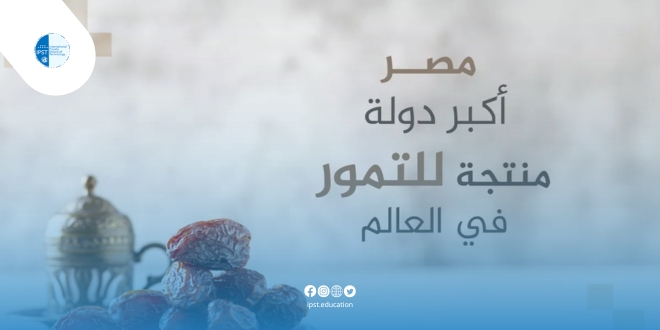Ramadan Dates: Their Nutritional and Economic Importance and the Dominance of Arab Countries in Production and Export
Dates are the primary food consumed during the month of Ramadan among Muslims, as they are rich in various minerals and vitamins that contribute to health. Dates are an excellent source of iron, potassium, calcium, and magnesium, in addition to being a good source of fiber. Therefore, dates enjoy great popularity in the Arab world, where Arab countries dominate the list of the largest producers and exporters of dates.
The Importance of Dates in Global Markets
The Food and Agriculture Organization (FAO) has highlighted the economic importance of dates in its reports, noting that global markets view this crop, which is grown in Southwestern Asia and North Africa, as a high-value fruit. The FAO reported that annual date production has seen significant growth, increasing from 1.8 million tons in 1961 to over 9 million tons in 2023, reflecting the growing demand for this fruit.
Health Benefits of Dates
Dates are characterized by their high calorie content, making them an excellent source of energy, in addition to their sweet taste, which makes them a natural substitute for refined sugar. The FAO also pointed out that dates are a healthy option that can help combat obesity, as over two billion people around the world suffer from overweight. Additionally, dates are rich in fiber, which helps improve digestion, and contain essential minerals like potassium, magnesium, and copper, as well as being a good source of antioxidants.
Dates as an Energy Source and Chronic Disease Prevention
Dates help reduce the risk of chronic diseases due to their antioxidant and anti-inflammatory compounds. The long lifespan of date palms also helps reduce food waste. It is also worth mentioning that dates are commonly offered as a symbol of hospitality in many Middle Eastern cultures.
Date Production in Arab Countries
Arab countries dominate date production globally. According to the FAO, the total global date production in 2023 reached 9.66 million tons. Below are the major date-producing countries in 2023:
- Egypt: 1.86 million tons
- Saudi Arabia: 1.64 million tons
- Algeria: 1.32 million tons
- Iran: 1 million tons
- Iraq: 636,000 tons
- Pakistan: 503,000 tons
- Sudan: 442,000 tons
- Oman: 395,000 tons
- Tunisia: 386,000 tons
- United Arab Emirates (UAE): 329,000 tons
Top Date Exporting Countries by Revenue in 2023
According to data from the World Bank, the top date exporting countries by revenue in 2023 were:
- Saudi Arabia: $390 million
- United Arab Emirates (UAE): $328 million
- Israel: $272 million
- Tunisia: $256 million
- Egypt: $88 million
Top Arab Date Exporters
- Saudi Arabia: $390 million
- United Arab Emirates (UAE): $328 million
- Tunisia: $256 million
- Egypt: $88 million
- Palestine: $69 million
- Jordan: $59 million
Largest Date Importing Countries in 2023
According to the FAO, the largest date importing countries in 2023 were:
- European Union: $358 million
- India: $267 million
- Morocco: $241 million
- United Arab Emirates (UAE): $215 million
- France: $108 million
Top Arab Date Importers
- Morocco: $241 million
- United Arab Emirates (UAE): $215 million
- Kuwait: $36 million
- Oman: $29 million
- Jordan: $29 million
Sources:
- Food and Agriculture Organization (FAO)
- World Bank Reports
- Specialized agricultural and food statistics websites.



